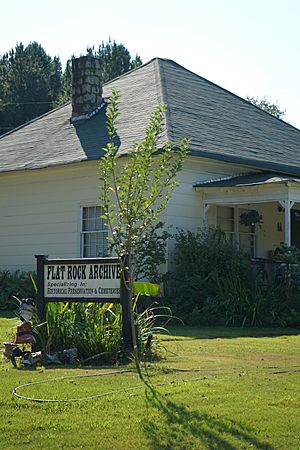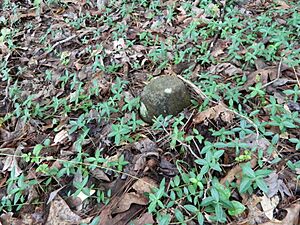Flat Rock, Georgia facts for kids
Flat Rock is a special historic community in DeKalb County, Georgia. It's a place where African American families have lived for a very long time. You can find it inside the city of Stonecrest, within the beautiful Arabia Mountain National Heritage Area.
Many people believe Flat Rock is one of the oldest African American settlements in DeKalb County. It was first settled around 1820, near the hunting grounds of the Creek and Cherokee Native American nations. After the Civil War ended in 1865, formerly enslaved people had a chance to build a new life. They stayed in Flat Rock, creating schools, churches, and community groups. This helped form the strong Flat Rock community we know today. Over the years, the community has faced challenges like the Black Codes, Jim Crow rules, and the Great Migration. Today, the Flat Rock Archives works to save and share the rich history of African Americans in rural Georgia.
Contents
Flat Rock's Story
The first known mention of Flat Rock is on a map from 1822. After 1865, Flat Rock stopped appearing on maps, probably because the nearby town of Lithonia was growing. But the community kept going strong. It was never officially made into a town.
Flat Rock began as a settlement for African Americans, likely because of the slave-holding farms around it. After slavery ended, many formerly enslaved people couldn't easily move away. So, they stayed and built their lives in Flat Rock. Some of the first families to live there were the Bryant, Ford, Henderson, Holt, Reid, and Waites families. The Flat Rock post office was the only government building there until it closed in 1900. Flat Rock also had some of the first churches in the area that welcomed both Black and white members.
During the Great Migration, many African Americans moved from the South to northern cities. But T.A. Bryant Sr., a Flat Rock resident, wanted to keep his community together. He bought 45 acres of land for $600. Then, he sold smaller pieces to his family and neighbors. This helped them stay in the area. As NPR once shared, historian Henry Louis Gates said Bryant was "trying to give them a stake in the South, a reason to stay." He knew they might not own land in big cities like Pittsburgh or Detroit.
Flat Rock remained quite separate from other places until the 1940s. Telephone and electricity lines finally reached the community during World War II. But many roads stayed unpaved even into the 1980s.
Flat Rock Archives
The Flat Rock Archives is a special place in Stonecrest, Georgia. It works hard to save and share the history of African Americans in this area. For example, by studying the Lyon family who lived nearby, the Archive learned that in 1860, the Lyon farm had three houses for enslaved people. Records show the Lyons family had seventeen enslaved people. One of them was Mary Lyon, who had a son named Thee Lyon.
The Flat Rock Archive wants to preserve African American rural history in Georgia. It is located in the home built by T.A. Bryant Sr., which was later given to the Archive by his son, Reverend T.A. Bryant, Jr. The Archive is a museum and a place for people to research their family history. It also helps people learn about the area's heritage. Besides collecting old items, records, and stories from formerly enslaved people and their families, the Flat Rock Archive also takes care of the nearby Historic Flat Rock Cemetery.
Important Places to Visit
The Flat Rock Archives includes several important historic sites. Many of these places are connected by the paved Arabia Mountain PATH trail. All these sites are found within the Arabia Mountain National Heritage Area.
The T. A. Bryant, Sr. House & Homestead
The T. A. Bryant, Sr. House and the land around it are central to the Flat Rock Archives. They are also key to understanding the story of the Flat Rock Community. The house was built in 1917. After Bryant Sr. bought the land, he sold or leased small parts of it to other Flat Rock community members. By doing this, Bryant Sr. helped people own land in the South. This kept the people of Flat Rock together.
The Historic Flat Rock Cemetery
The Historic Flat Rock Cemetery is a very important part of the Flat Rock community. Many people from throughout the community's history are buried here. You can find a list of some of the people buried there on the Flat Rock Archives website. This list only includes those who have been clearly identified. Many more people are buried there without clear historical records.
In 2008, Dr. Jeffrey Glover from Georgia State University led a project to map the cemetery. His students worked with the local Flat Rock community and the Greater Atlanta Historical Society. They cleared away plants that had grown over the cemetery. Then, the students recorded information about the graves using cameras and special forms. They also used a tool called a total station to map the exact location of each grave. The project found 202 graves in total. Of these, 107 were unmarked fieldstones.
Lyon House
The Lyon House was built in the 1820s by Joseph Emmanuel Lyon, a former British soldier. This house and the land around it are important to Flat Rock's beginnings because people were enslaved here. The Lyon House was repaired and made stable in 2019. Today, it is part of the Flat Rock tours.
Flat Rock Church
The Flat Rock Church was a very important meeting place for the community for many decades. The original church building is no longer standing. However, a new church has been built on the same spot. Archaeologists and historians with the Flat Rock Archives are working to preserve the church's role in the community's history.
Famous People from Flat Rock
| Name | Known For | Connection to Flat Rock |
|---|---|---|
| Lee Brown | 59th Mayor of Houston, criminologist, and businessman | A direct descendant of early Gault family members from Flat Rock |
| Willie Gault | NFL football player and track and field athlete | A direct descendant of early Flat Rock community members Reece Gault and Agnes Waits (who was born enslaved) |
| Warren Moon | NFL and CFL football player | A direct descendant of John Waits, an early Flat Rock Methodist Church Trustee, and Agnes Wise Waits |
| Chris Tucker | Actor and stand-up comedian | A direct descendant of Spencer Bryant, an early Flat Rock Methodist Church trustee |
| Ernest J Waits, Sr. 'Ernie' | Civil Rights pioneer, first African-American DJ in Cincinnati, Ohio | A direct descendant of Agnes Wise Waits |
| Robert E. Wooten, SR. | Founded the Wooten Choral Ensemble in 1949 | A direct descendant of Floral Waits and John Waits, an early Flat Rock Methodist Church trustee |
| Bobby Wooten | Music Producer | A direct descendant of Floral Waits and John Waits, an early Flat Rock Methodist Church trustee |



